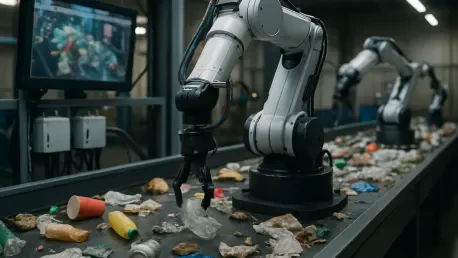Amid escalating environmental concerns, the rapid shift in waste management towards artificial intelligence innovations presents both an opportunity and a necessity for improvement. As the global community grapples with the immense challenge of managing plastic waste, AI’s role in revolutionizing this sector has become increasingly essential. This article delves into the growing integration of AI in waste management, providing insights into its applications, industry expert opinions, and speculating on its future trajectory.
The Rise of AI in Waste Management
Data and Growth Trends
Within the waste management sector, AI technology adoption is witnessing unprecedented growth, with data reflecting a steep increase in its usage. Recent studies indicate that AI-driven processes have become integral to enhancing efficiency in waste management operations worldwide. These statistics from respected industry reports show a clear trajectory of AI’s influence, underpinned by its capacity to streamline operations and optimize resource allocation, marking a significant departure from traditional waste management practices.
Real-World Applications
Tetra Pak, a global leader in packaging solutions, exemplifies the transformative potential of AI with its deployment of sophisticated technologies at its UK facilities. The QuantiSort system, developed in collaboration with Recycleye, leverages AI to significantly improve the efficiency of waste sorting processes. This technology distinguishes and classifies beverage cartons from mixed waste streams with remarkable precision. This example highlights how leading-edge companies are pioneering methods to address global sustainability issues, particularly the daunting task of managing plastic waste.
Expert Insights on AI Transformations
Industry experts and thought leaders emphasize the critical importance of AI in transitioning waste management processes for greater efficiency and sustainability. Victor Dewulf, CEO of Recycleye, highlights AI technology’s adaptability, noting that its ability to learn and respond to changing waste streams places it at the forefront of future-ready solutions. These expert insights underline both the transformative impact AI can have in addressing current waste management challenges and the hurdles that yet remain, including data accuracy and technology integration.
Moreover, industry professionals point to AI’s potential to drastically enhance recycling rates and recovery processes. By integrating AI systems, companies not only meet increasing regulatory demands but also achieve significant environmental benefits. The consensus among experts is that while the promises of AI are vast, companies must prepare to navigate the complexities of implementation to fully leverage these gains.
Future Outlook of AI in Waste Management
The horizon of AI in waste management showcases promising advancements poised to escalate further in the coming years. Anticipated developments include more sophisticated AI algorithms enabling higher accuracy in waste processing and identification. The potential benefits are manifold, such as improved waste diversion rates and reduced environmental footprints; however, challenges persist, notably in balancing technological investment with operational efficiency and scalability.
The broader implications for industries at large suggest a paradigm shift toward more sustainable practices. The drive to integrate AI is expected to yield positive outcomes, yet caution is warranted as unforeseen challenges may arise. These trends point to a future where AI not only enhances waste management capabilities but also contributes significantly to a sustainable industrial ecosystem.
Conclusion and Call to Action
Throughout this analysis, the pressing need for innovation in waste management is evident. AI plays a pivotal role in revolutionizing the industry by offering cutting-edge solutions to complex challenges. The ongoing efforts by companies like Tetra Pak and the insights from industry experts underscore AI’s transformative power.
Looking ahead, stakeholders across sectors must actively engage in the adoption and refinement of AI technologies to ensure a sustainable trajectory for waste management. By fostering collaboration and investing in innovation, the industry can not only meet immediate sustainability goals but also pave the way toward a more environmentally conscious future.









